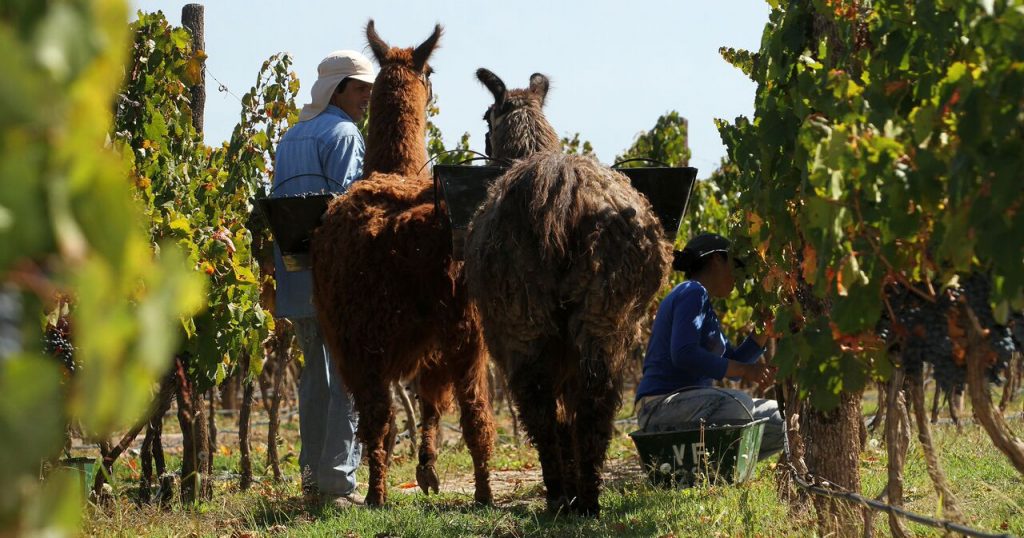Argentine wine reached its privileged status thanks to Malbec, high scores from those in the know and hypnotic picture postcard vineyards. However, the industry has other reasons to feel proud of itself. Among these, the time and resources dedicated to sustainability programs, with a strong environmental and social commitment which many are beginning to appreciate.
Global warming, limited natural resources and energy problems are some of the many problems facing the global wine industry. Like all products from the earth, wine demands optimum environmental conditions, and it is the producers who must look after it.
Argentina faces these difficulties together with all wine producing countries in the world, and applies various processes that develop ideal environmental conditions, both for the vines and for those who produce the wines that we enjoy.
With this in mind more and more wineries are presenting their corporate social responsibility policies based on sustainable practices in order to optimise resources and implement procedures aimed at reducing the impact of this activity on the environment.
For this reason, winemakers and agronomists have made commitments such as reducing carbon emissions, recycling waste, reusing water, minimising the handling of their wines and implementing alternative methods of power generation.
In tune.
Consumers are no longer content with only knowing where, how and who made their favorite wine, they are also concerned with whether it is sustainable and environmentally friendly. For many experts, this aspect has already become a new driver of purchase that the industry should heed.
These environmental and social issues have set the agenda of the Argentine wine business for a decade. Back then each winery drew from their own experience, until 2010, when Bodegas de Argentina assembled its Committee on Sustainability. This joint effort created a Self-Assessment Sustainability Protocol, a tool that from 2013 used companies from the sector to evaluate vital parameters and identify opportunities for improvement.
“We began to optimise the resource at the start of the water crisis, and we work with member countries of the World Wine Trade Group on issues related to sustainability. We managed to double the number of wineries involved in our programs and the panorama is very encouraging, “recalls Luis Romito, coordinator of the commission for Bodegas de Argentina. Thanks to this, the Argentine wine industry already has high standards in sustainability management, a key factor that improves the competitiveness of wine on world markets. “We are a long way from the markets most concerned about sustainability. Good environmental practices allows us to offset the impact of freight and prove we are moving into sustainability, “concludes Romito.
Among the cases which stand out for their progress in sustainability is Bodega Salentein, firstly for being carbon footprint certified for its Portillo Malbec which today applies to the whole line of products marketed globally. Meanwhile, bottles, labels and environmentally friendly inks are just some of the ways companies are beginning to change.
In the same vein, the advances in water footprint are also commendable. In arid and desert like areas, water resources are always a cause for concern.
This has prompted several wineries to work on their water footprint. “As part of our water footprint program we measure the water basins in the Uco Valley and Pedernal (San Juan). This monitoring of supply and demand for water allows us to be aware of possible contingencies, “says Andrew Arena, Chief Operating Officer at Bodega Salentein and president of the local Committee of sustainability.
However, sustainability involves more than environmental aspects. In this regard, it is worth noting that about one hundred wineries are implementing corporate social responsibility policies and looking after the welfare of the local community, the environment and at the same time seeking better working conditions for employees.
Expanding Fair Trade
In 2015, five billion euros worth of Fair Trade products were sold worldwide. This figure is 10% higher than in 2014 and marks a constant growth since 2008. It seems that despite little recovery in the global economy, millions of consumers are determined to collaborate with those behind the products we consume.
Fair Trade products exist in many different industries, wine being one of them, and Argentine wineries reflect that. With its aim of protecting those most vulnerable in the industry from processes that integrate environmental, social and economic issues, the Fair Trade label is becoming increasingly popular in the markets of Europe, the United States, Canada and Asia.
Introduced in Argentina by the Cooperative, La Rioja in 2006, the sustainable production system has already been applied to a dozen local wineries, exclusively for wine for export. However, for 2016 the certifying institution expects several producers to join this list which includes names like Alta Vista, Cooperativa La Riojana, La Celia, Vinecol, Furlotti, Cinco Sentidos, Trivento and Norton, among others. The objectives that drive them to incorporate Fair Trade practices are: + ensuring a system of fair pay, good working conditions, integration and social commitment and environmental awareness.
An example of the progress of these practices in Argentina, was the presentation of Monteflores Malbec in 2015. This wine, produced by Alta Vista, became the first to be sold in the domestic market with the Fair Trade stamp. “After four years of marketing Monteflores Malbec in international markets, we decided to present it in Argentina and bet on the development of a local fair trade market,” says Paul Francis, general manager of the winery. “Argentina is a hub for expanding fair trade and we want to contribute to the growth.” Since 2011, a portion of the proceeds from the global sales of this wine have gone to the Asociación Flores del Monte (www.floresdelmonte.org), consisting of 61 families that represent workers in the vineyard and the winery.
This case may be the beginning of a local Fair Trade market. “Initially, wineries develop Fair Trade labels for markets where the demand is sustainable, but there is already interest in offering them in the domestic market and that undoubtedly contributes to the growth of the segment,” says Julie Francoeur, specialised consultant in Fair Trade in Argentina. “There is much interest from wineries and huge potential for Argentine wines which carry this stamp.”
These practices and policies reveal that Argentina´s wine industry is part of a group of countries which project long-term activity with a significant social and environmental commitment. An effort that ensures the best reward for the planet and the thousands of silent protagonists behind each bottle of Argentine wine.
[:]



